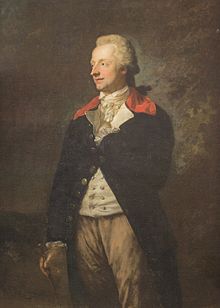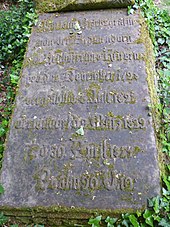Johann Georg Friedrich von Friesen

Johann Georg Friedrich Freiherr von Friesen (born April 28, 1757 in Rötha , † January 18, 1824 in Dresden ) was a German manor owner , Lord Chamberlain , Privy Councilor and supervisor of the art collections and library in Dresden.
Life
Johann Georg Friedrich Freiherr von Friesen was the son of Johann Friedrich Ernst Freiherr von Friesen (1725–1768) and his wife Christiane Jacobine, nee Countess von Werthern (1727–1778). In addition to Rötha, from 1768 to 1773 he also owned the royal lordship of Königsbrück and the Cosel manor , which he sold to Sigismund Ehrenreich von Redern . After taking lessons from a tutor, he went with him to the Collegium Carolinum in Braunschweig for two years in 1773 . He then studied law at the universities of Wittenberg and Leipzig until 1777 . As early as 1775 he received from the Saxon Elector Friedrich August III. awarded the title of Kammerjunker .
After successfully passing his exams, Friesen took up a brief position as an assessor at the Leipzig Higher Court . Then a year-long trip took him to England , Switzerland , France and Italy . After his return he devoted himself to the manor economy at his castle Rötha . In the same year he was appointed elector chamberlain.
For the first time he was represented in 1781 as a representative of the general knighthood at a state parliament of the Saxon estates in Dresden. At the next meeting of the estates in 1787 he became director of this body. In 1793 and 1799 he was a member of the further committee of the knighthood and since the state parliament 1805 in the narrow committee of the knighthood .
In 1783 he was appointed to Dresden as chief tax collector. In 1784 he was also electoral commissioner at the fire insurance commission, and other honorary posts followed.
In 1810 the Saxon King Friedrich August I appointed him to the Privy Council and took him into service. On March 17, 1812, Friesen became Lord Chamberlain at the Dresden court and in this function was entrusted several times with the personal care of Napoleon . During the Battle of the Nations near Leipzig he was initially at the Dresden court by order of Friedrich August, while his Rötha Palace served as the headquarters of the Allied opponents. Only when the Saxon king was captured by the Allies on October 19 did he leave Dresden and go to Rammelburg Castle, which also belongs to him and does not belong to Saxony, in the Rammelburg office of the same name in the Lower Harz.
When the Russian Prince Nikolai Grigoryevich Repnin-Volkonsky became governor-general in Saxony after the Battle of Nations , Friesen returned to Dresden in December 1813, became a member of the government council and Repnin's personal advisor. As president of the “Relief and Restoration Commission”, he helped to provide for the population in need after the war and to rebuild the destroyed country, mainly by means of English loans.
After the return of the Saxon king to Dresden in 1815, Friesen resumed his old offices, especially that of Lord Chamberlain. He was Hereditary Marshal Administrator of the Landtag 1817/1818 as well as a member of the select committee of the knighthood in the Landtag of 1820 and 1824 and took over numerous diplomatic tasks for the king.
In 1816 he settled in a villa in Blasewitz and from then on visited his manors only occasionally during the summer.
family
On November 2, 1778, Johann Georg Friedrich Freiherr von Friesen married Johanne Friederike Louise Caroline von Krosigk . The couple had three children:
- Heinrich Friedrich Ernst (born August 22, 1779 in Leipzig, † February 20 or 21, 1781)
- Louise Henriette Caroline (born September 4, 1780 in Rötha; † February 4, 1787 in Rötha)
- Caroline Jacobine Sophie (* October 7, 1781 in Rötha; † May 31, 1857) ⚭ June 10, 1802 with Hans Günther Werner von der Schulenburg, the brother of her stepmother (* February 17, 1777, † October 14, 1806 in battle von Auerstädt), Chief Chamberlain to the Grand Duchess of Weimar
His wife died giving birth to the third child. He then gave his two daughters to his sister who lived on the Caaschwitz manor in Thuringia.
On July 27, 1783 he married Countess Juliane Caroline von der Schulenburg (1764–1803), a daughter of Gebhard Werner von der Schulenburg , with whom he had 11 children:
- Juliane Charlotte (born June 9, 1784 in Dresden, † February 35, 1861 in Dresden), from August 25, 1814 to July 20, 1856 provost of the free aristocratic Magdalenstift in Altenberg
- Carl (born January 22, 1786 in Dresden; May 29, 1823 in Berlin) Legation Secretary of the Legation to the King of Westphalia in Cassel, later Captain in the General Staff of the Grand Duke of Weimar, Oberhofmarschall
- Heinrich (born February 18, 1788 in Dresden; † July 30, 1809 in Dresden), Lieutenant at von Polenz Chevauxlegers, wounded on July 12, 1809 near Berggiesshübel
- Johanne Friederike (born March 16, 1789 in Dresden, † August 6, 1825 in Dresden), canoness in Stetterberg
- Marie Louise (born December 2, 1790 in Dresden, † April 28, 1791 in Dresden)
- Elisabeth (* July 16, 1793 in Dresden; July 18, 1878 in Dresden) ⚭ March 30, 1818 with the Privy Councilor and Chief Stable Master Carl Alexander Nicolas, Count Vitzthum von Eckstädt (* July 3, 1768; † October 11, 1834)
- Louise (born November 27, 1794 in Dresden, † January 15, 1870 in Dresden), Lord Chamberlain of Queen Amalie of Saxony; first unmarried and Protestant chief stewardess at the royal Saxon court
- Friedrich (born October 11, 1796 in Dresden, † March 21, 1871 in Dresden), Lieutenant in the Leibgrenadier Regiment and President of the First Chamber of the Saxon State Parliament
- Charlotte (* November 12, 1798 in Dresden; † April 30, 1874), ⚭ July 5, 1821 with Werner Graf von der Schulenburg-Nimptsch from Beetzendorf (* August 7, 1797; † March 9, 1829). One of her children is Ernst Friedrich Werner von der Schulenburg-Beetzendorf . Her grave at the Beetzendorf estate cemetery is still preserved today.
- Ernst (born February 9, 1800 in Dresden; † June 19, 1869 in Kassel-Wilhelmshöhe), ⚭ October 12, 1831 in Wolfsburg with Julie Armgard Clara Countess von der Schulenberg-Wolfsburg (born January 23, 1809 in Wolfsburg; † 26. August in Rammelburg); ⚭ November 26, 1854 in Wiesbaden with Caroline Louise Wilhelmine Pauline Freiin von und zu Gilsa (born June 26, 1833), lieutenant in the Austro-Hungarian cuirassier regiment of Crown Prince Archduke Ferdinand, royal Prussian chamberlain and district administrator
- Hermann (born February 27, 1802 in Dresden, † January 23, 1882 in Dresden), Saxon field marshal and Shakespeare researcher
His second wife died on July 23, 1803.
On July 15, 1819, he went into his third marriage with Caroline Bamberger, who had lived in his household as a housemaid and educator for his children for 28 years, without making this public. However, as Mademoiselle Bamberger , he allowed her to participate in the social intercourse of the Friesen family.
Friesen owned the parental manor with Rötha Castle, the Trachenau estate and the Rammelburg estate and castle in the Harz region . At the time of his death, only three of his sons, Friedrich, Ernst and Hermann, were still alive and they inherited the three estates together. Friedrich took over the castle and Gut Rötha through value adjustment and in 1846 bought the Trachenau manor from his brother Herrmann.
literature
- Thomas Nabert: Johann Georg Freiherr von Friesen - statesman for the "most delicate and difficult locations" . In Schloss Rötha - Remembrance & Vision , Leipzig 2013, ISBN 978-3-936508-87-1 , pp. 120–123
- Josef Matzerath : Saxon estates at the end of the early modern period - Johann Georg Friedrich Freiherr v. Friezes. In: Sächsischer Landtagskurier, issue 1/2008, p. 18 f. ( Online edition ; PDF; 2.3 MB)
- Friedrich August Schmidt (Ed.): New Nekrolog der Deutschen. Second year, 1824. First issue Ilmenau: Bernh. Friedr. Voigt, 1824. pp. 162-167. ( Digitized version )
Individual evidence
- ↑ Landtag Courier Free State of Saxony 1/08, pages 18-19
- ↑ Schloss Rötha - Memory & Vision , p. 120
- ^ Ernst von Friesen: History of the free-lordly family of Friesen. Published by C. Heinrich, Dresden 1899, pp. 301ff
| personal data | |
|---|---|
| SURNAME | Friesen, Johann Georg Friedrich von |
| ALTERNATIVE NAMES | Friesen, Georg Friedrich Freiherr von |
| BRIEF DESCRIPTION | German manor owner , Lord Chamberlain , Privy Councilor and supervisor of the Dresden art collections and library |
| DATE OF BIRTH | April 28, 1757 |
| PLACE OF BIRTH | Rötha |
| DATE OF DEATH | January 18, 1824 |
| Place of death | Dresden |

